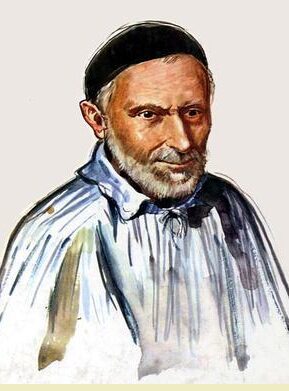The threads of Vincent’s life show a pattern for Vincentians to hold themselves accountable:
- Rootedness in the baptismal faith
- Event as expression of the will of God
- Special attention to disastrous situation (material and spiritual)
- The importance accorded to action
- Prayer as the place of “verification” of all actions
- The special link between faith and life
- The conviction of the importance of announcing the Gospel as a force for salvation
- The necessity of alleviating corporal and material needs rooted in charity
- Misery and disbelief as forces that question/challenge
Pierre Renouard, CM offers us the specifics to reflect on… our our twists and turns may be different but perhaps we can recognize stages in our own conversion.
- A childhood spent in the country marked by faith, toiling the earth and by the example of his family.1
- A hasty entrance into the priesthood which can be viewed from the perspective of faith but also from a possibility of integrating himself in society; a career enhancement for him and for his family.2
- A life marked by numerous and varied geographical stages (Dax – Toulouse – Buzet – Tarbes – Chateau l’Eveque – two unknown years – Avignon – Rome – Paris) according to intellectual and ecclesial exigencies… with a certain taste for independence and for fantasy—or perhaps even for adventure.
- A race towards obtaining benefices as was the custom of the time. Saint Vincent would have three benefices at the same time within the years 1612-1615 (Saint Leonard de Chaumes, Clichy, Gamaches).
- A difficult, turbulent arrival in Paris (many houses, many locations).
- A first encounter with injustice that involved his reputation, through an unmerited accusation of theft3 and the temptation against faith which at first shook him and caused him moral and psychological distress.4 These were his interior spiritual experiences.
- An extraordinary situation with his coming to the Gondi household, the nobility and introduction to the world of prisoners by his chaplaincy among the galley slaves.
- Significant encounters like those with Berulle (from 1608), Duval (and through him, Benedict of Canfield, Thomas a Kempis, the Rhenish-Flemish mystics), Saint Francis de Sales, Louise de Marillac, (from 1620), Marguerite Naseau, Jeanne de Chantal, etc…. From the man of many acquaintances that he was to a man of mutual spiritual influence.
- A first external experience marked by events in GannesFolleville in January 1617. From that experience came the idea and the realization of the Mission.5
- A second external experience, complementing the former, in Chatillon when Vincent discovered the urgency and the necessity of the Confraternity of Charity.6
- In January 1618: organization of Mission-Charities, in the course of which Saint Vincent proclaimed the truths; reconciled (with God and man), converted and engaged in the service of the less fortunate.7
- From this date on, what follows can be called institutional experiences:
Following Folleville: the foundation of the Congregation of the Mission (1625-1628), the deacons (1628) with all their ramifications (retreats for the priests, opening of seminaries, Tuesday Conferences), foundations in Rome, in the foreign land, in Madagascar. The particular mission pushed Vincent to the universality of the mission.
Following Chatillon: we find the foundation of the Charities in the villages, then in Paris and followed by the establishment of the Daughters of Charity (1633), Ladies of Charity, the ransoming of the slaves, the foundlings, the aid to victims, etc….
Can you identify similar experiences in your life?
Outline of original article which reently appeared on the site We are VIncentians.
- “All our work is in action.”
- To consume oneself for God and for the poor
- Given to God
- To be a man of prayer
- To live for Christ
- Serving the Poor, he serves Jesus Christ
- To serve the whole man
- To pass into action
- Functional virtues
- Together
- For the pleasure of God
- Words for the future
Tags: Vincent

